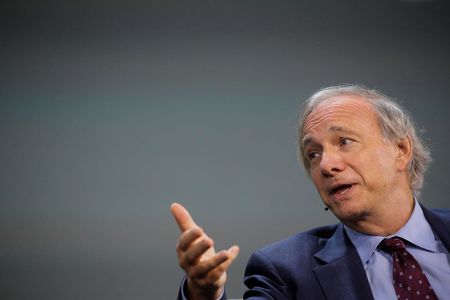(Corrects May 15 story to “million” (not “billion”) in paragraph 8)
By Carolina Mandl
SAO PAULO (Reuters) -Bridgewater Associates, one of the world’s largest hedge funds, sold U.S. bank stocks in the first quarter as the collapse of regional lenders rattled investors, according to regulatory filings.
The firm, founded by billionaire Ray Dalio, exited positions in five U.S. banking giants: JPMorgan & Co, Bank of America Corp, Wells Fargo & Co, Goldman Sachs Group Inc and Morgan Stanley.
It also roughly halved its exposure to Citigroup Inc, the filings showed.
The bets were revealed in quarterly securities filings known as 13-Fs. While backward looking, these snapshots show what funds owned on the last day of the quarter and are one of the few ways that hedge funds and other institutional investors have to declare their positions. They may not reflect current holdings.
Global hedge funds cut their exposure to U.S. banking stocks to a near 10-year low in March. They fled after the collapses of Silicon Valley and Signature banks, followed by UBS’ hastily arranged takeover of rival Credit Suisse.
Bridgewater did not immediately respond to a request for comment.
The firm also slashed its positions in smaller banks such as Bank of Hawaii Corp and Pacwest Bancorp, as well as regional lenders PNC Financial Services Group, Citizens Financial Group and Capital One Financial Corp.
At the end of December, Bridgewater’s biggest stake in banks was Bank of America, valued at $106.2 million, followed by $92.8 million in JPMorgan.
Bridgewater was also bearish on European banks in March as SVB’s failure fueled fears of contagion. Earlier this month, JPMorgan bought First Republic Bank after the latter company was seized by U.S. regulators.
The S&P 500 banks index has fallen 15.2% this year.
Bridgewater’s changes in banks stocks, by number of shares:
Bank Q42022 Q12023
JPMorgan 0 692,356
Morgan 0 62,501
Stanley
Bank of 0 3,205,636
America
Goldman 0 100,908
Sachs
Citigroup 623,040 1,283,504
Wells 0 1,719,089
Fargo
(Reporting by Carolina Mandl in Sao Paulo; Editing by Lananh Nguyen and Stephen Coates)



